 Petzlover
Petzlover Russo-European Laika is originated from Russia but Welsh Corgi is originated from United Kingdom. Russo-European Laika may grow 30 cm / 12 inches higher than Welsh Corgi. Russo-European Laika may weigh 8 kg / 18 pounds more than Welsh Corgi. Russo-European Laika may live 4 years less than Welsh Corgi. Both Russo-European Laika and Welsh Corgi has almost same litter size. Russo-European Laika requires Low Maintenance. But Welsh Corgi requires High Maintenance
Russo-European Laika is originated from Russia but Welsh Corgi is originated from United Kingdom. Russo-European Laika may grow 30 cm / 12 inches higher than Welsh Corgi. Russo-European Laika may weigh 8 kg / 18 pounds more than Welsh Corgi. Russo-European Laika may live 4 years less than Welsh Corgi. Both Russo-European Laika and Welsh Corgi has almost same litter size. Russo-European Laika requires Low Maintenance. But Welsh Corgi requires High Maintenance
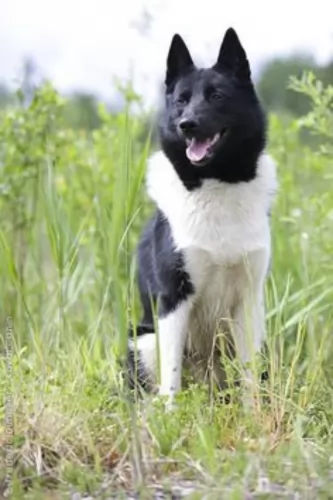 The Russo-European Laika is a hunting dog that comes from Russia.
The Russo-European Laika is a hunting dog that comes from Russia.
It is a dog that has been developed from Spitz type dogs. A breeding program was started for the dog in 1944.
The Russo-European Laika dog is recognized by the Federation Cynologique Internationale in the Spitz and Primitive type group.
 The Pembroke Welsh Corgi and the Cardigan Welsh Corgi were once considered to be two types of the same breed. Today they are recognized as very different breeds, but cousins of sorts.. They are alike in many ways and very different in others. The general information in terms of height and weight above applies to the more popular and better known Pembroke Welsh Corgi, developed as a herding dog from the spitz line in Pembroke shire, Wales. The Pembroke is famous for being the breed favored since childhood by Queen Elizabeth, the current queen of England. It’s believed that the Pembroke came to the country around the 10th century with Flemish weavers. The Cardigan is thought to have come with the Norse people and be a relative of the Sedish Vallhund.
The Pembroke Welsh Corgi and the Cardigan Welsh Corgi were once considered to be two types of the same breed. Today they are recognized as very different breeds, but cousins of sorts.. They are alike in many ways and very different in others. The general information in terms of height and weight above applies to the more popular and better known Pembroke Welsh Corgi, developed as a herding dog from the spitz line in Pembroke shire, Wales. The Pembroke is famous for being the breed favored since childhood by Queen Elizabeth, the current queen of England. It’s believed that the Pembroke came to the country around the 10th century with Flemish weavers. The Cardigan is thought to have come with the Norse people and be a relative of the Sedish Vallhund.
The Cardigan Welsh Corgi, also a herding dog has their ancestry in ancient Celtic dogs. They are older than the Pembroke and hail from Cardiganshire, Wales.
Both breeds are friendly, smart and independent. Both dogs herd cattle and sheep. About the end of the 19th century, farmers in Cardiganshire began to raising sheep rather than cattle. The corgis were herding dogs for cattle. “Heelers” who avoid the cattle kicking them by nipping at the cattle’s heel. Pembrokeshore and Cardiganshire are counties in South West Wales that adjoin each other.
Then the move was made from cattle to sheep in Cardiganshire they bred their corgis with the Welsh Sheepdog where the merle color is said to come from, and the Pembroke Welsh Corgi. This caused the similarities between the two dwarf breeds. At the same time the distance grew between the two breeds and they grew into very distinct and different looking dogs. There are also some differences in their personalities.
The first corgi to appear at Crufts came in 1927 and in 1928 a Pembroke won a championship at Cardiff for the first ever corgi win. It was not until 1934 that the kennel club recognized them as separate breeds rather than a Pembroke shire type and a Cardiganshire type. From this point on the two are separate breeds with tremendous similarities. A Pem won the Reserve Best in Show at Crufts in 1955.
The first corgi came to the United States in 1933 by a breeder of Old English Sheepdogs. In 1934 the American Kennel Club (AKC) recognized Corgis as one breed with 2 types. The Pembroke has always been the more popular of the two.
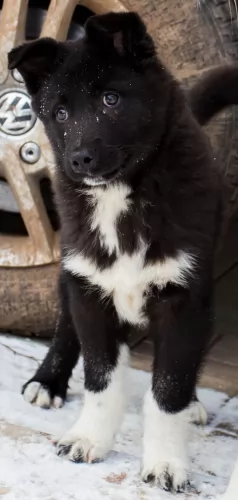 The Russo-European Laika is a medium sized dog Spitz dog that stands at between 54 to 60cm in height and weighs in the region of 20 – 23kg.
The Russo-European Laika is a medium sized dog Spitz dog that stands at between 54 to 60cm in height and weighs in the region of 20 – 23kg.
The dog has quite a strong resemblance to the Karelia Bear Dog. They are sometimes mistaken for each other.
The Russo-European Laika has the typical triangular shaped head with small dark eyes, a black nose and erect, pointed ears. These are deep chested dogs.
As with other Spitz breeds, this dog has a thick fur with a densely furred tail which is curved over the back. The double coat is fairly long and usually a dark grey color or black with some white markings. Sometimes the dog has a white coat.
This is a lively, energetic dog breed that loves to spend time outdoors. It has always been used to alert hunters to prey, using its bark to alert the hunter.Training and socialization will be necessary for the dog if you don’t want it to be barking in the house too.
He makes an excellent guard dog, protecting his human family. It is very tolerant of children too, getting on well with them as well as other pets.
The dog is known for being totally devoted to its family, being an affectionate and loyal breed that doubles as a family pet and guard dog.
 They used to differentiate between the Cardigan and the Pembroke by saying the Cardigan was the one with the bigger ears and the Pembroke had no tail. In many parts of the world where tail docking has been banned, most Pembrokes now have tails. Only those born without don’t have them. Both dogs are long and low to the ground with big chests and short legs. This is because they are dwarfs. They are not little dogs.
They used to differentiate between the Cardigan and the Pembroke by saying the Cardigan was the one with the bigger ears and the Pembroke had no tail. In many parts of the world where tail docking has been banned, most Pembrokes now have tails. Only those born without don’t have them. Both dogs are long and low to the ground with big chests and short legs. This is because they are dwarfs. They are not little dogs.
The Cardigan Welsh Corgi is heavier boned than the Pembroke, has large rounded ears and a flowing, fox like tail. The Cardigan comes in a variety of colors but never predominately white. He is double coated with a dense, harsh outer and a soft, short and thick undercoat.
Pembroke is smaller and longer than the Cardigan with pointed ears. They are intelligent, sturdy and strong with tremendous stamina. The tail is docked in the United States or the pups are bred not to have a tail. This was originally so that the cattle could not step on their tails and injure the dogs. The double coat on the Pembroke is short and weather resistant inner coat with a longer and rougher outercoat. He has the same deep dropped chest as the Cardigan. Both corgis shed voraciously.
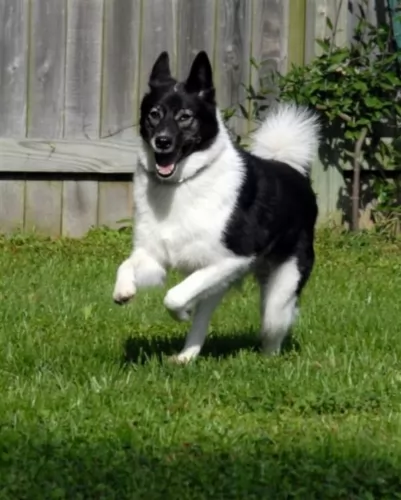 This is an intelligent dog breed, loving the time he spends with his human family but reluctant to be patted by strangers.
This is an intelligent dog breed, loving the time he spends with his human family but reluctant to be patted by strangers.
They also get along with pets that they have grown up with. They get on well with kids and make great watchdogs too. Small wonder they make such sought after pets and companions.
 1Children friendliness For the most part they are good but can be grumpy and bossy. They are bossy personalities
1Children friendliness For the most part they are good but can be grumpy and bossy. They are bossy personalities
3.Adaptability – Very. Can live anywhere but they do need to run and they bark a lot.
4.Learning ability – incredibly smart but stubborn. Respond well to training that is reward based.
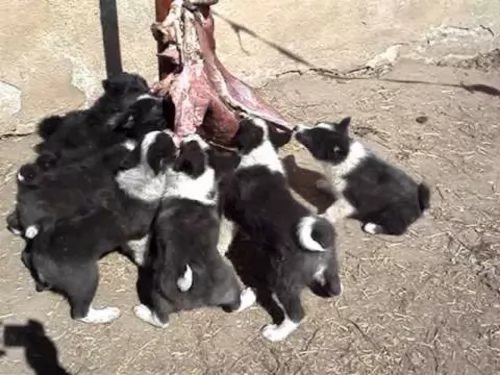 These Spitz type dogs are always known to enjoy good health, and owners don’t have to worry too much about their health as only a small number of health issues are reported with this healthy dog breed.
These Spitz type dogs are always known to enjoy good health, and owners don’t have to worry too much about their health as only a small number of health issues are reported with this healthy dog breed.
This is a congenital defect in the abdominal muscles and can result in fat or tissues being evident under the skin. A bulge is often seen in the area of the abdomen. Larger hernias will require surgery.
 • Degenerative Myelopathy – a muscular neurological disease very similar to Lou Gehrig’s Disease or ALS. It is always fatal.
• Degenerative Myelopathy – a muscular neurological disease very similar to Lou Gehrig’s Disease or ALS. It is always fatal.
• Some have cardiac issues while others may have hip dysplasia or Von Willebrand’s disease.
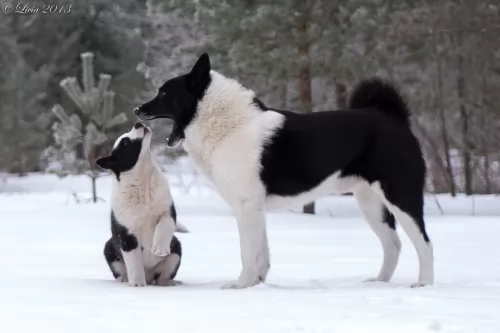 This is an energetic dog and will require a good amount of excerise. This dog isn’t suited to living in the city as they are highly active. Apart from wanting large grounds to run around in, he will need walks as well as ball- and rope games to keep him busy.
This is an energetic dog and will require a good amount of excerise. This dog isn’t suited to living in the city as they are highly active. Apart from wanting large grounds to run around in, he will need walks as well as ball- and rope games to keep him busy.
He is intelligent and needs some form of mental stimulation. There are good quality toys which one can buy for these dogs than can make them think.
Many things can change a dog’s longevity, and diet is one. A good nutritious diet with vitamins and minerals will give your dog less of a chance to get sick.
If you go for the best quality commercially manufactured dog foods, you’ll find that they are both convenient and well balanced.
To provide your dog with just a bit of variety in his diet, some home-made food added into the dry kibble from time to time will delight your pet.
No need to make preparing the food a huge issue either. Boil brown rice and chicken in a pot and add in sweet potatoes, carrots and spinach. Chop all this up and add small portions of it into the dry kibble.
Try to include a bit of raw meat occasionally and never let your dog be without a constant source of fresh, cool water
 1Feeding the puppy prone to overweight, the pem needs ½ to 1 cup of small breed high quality food in 3-4 meals per day. The Cardigan needs ¾ to 1 ¼ cups of high quality small breed food in 3-4 meals per day.
1Feeding the puppy prone to overweight, the pem needs ½ to 1 cup of small breed high quality food in 3-4 meals per day. The Cardigan needs ¾ to 1 ¼ cups of high quality small breed food in 3-4 meals per day.
2.Feeding the adult – Don’t overfeed them. The Pem need 1 cup per day of high quality small breed food in 2 meals per day. The Cardigan needs 1-1 ½ cups per day in one to two meals.
They are fast, athletic dogs. Agility, CAT, Barnhunt. Herding trials, flyball and they just love backyard ball fetching. Confirmation and obedience, along with rally.